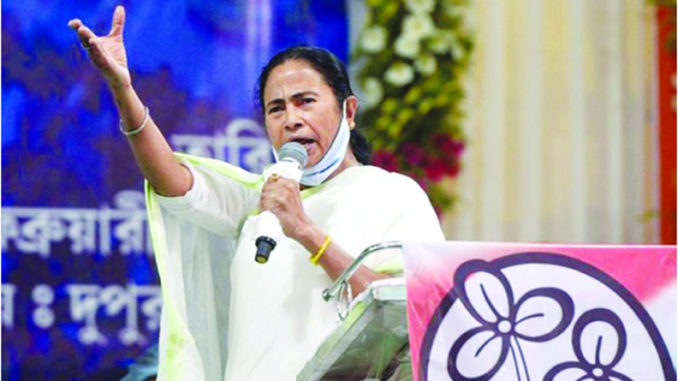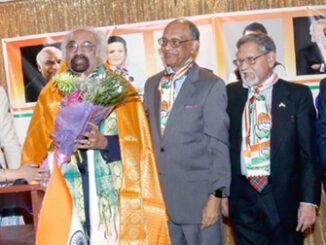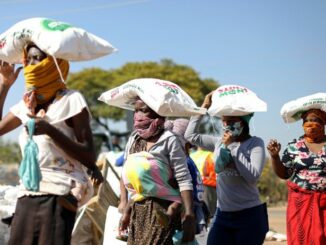
All India Trinamool Congress (AITC) supremo Mamata Banerjee, also known as Didi (elder sister in the Bengali language), sworn in as the Chief Minister of West Bengal for the third term on 5 May 2021 after she pulled off a landslide victory in the West Bengal Assembly Elections 2021. Ahead of the oath-taking ceremony, she resigned as the Chief Minister of West Bengal at Raj Bhavan in the presence of Governor Jagdeep Dhankhar (as per the practice) and took the oath of the office and secrecy again. She lost the Nandigram Assembly Constituency to Suvendu Adhikari (BJP) in 2021.
After her separation from the Indian National Congress, she founded the All India Trinamool Congress (AITC or TMC) in 1998. She spearheaded the AITC alliance to a landslide victory in the 2011 West Bengal Assembly Elections, defeating the 34-year-old Communist Party of India (Marxist). She was a member of the West Bengal Legislative Assembly from the Bhabanipur Assembly Constituency from 2011-2021.
Apart from serving as the Chief Minister of West Bengal, she has held key positions in the Union Cabinet such as first female Minister of Railways, first female Minister of Coal, and Minister of Human Resource Development, Youth Affairs and Sports, Women and Child Development. She has served as the Minister of Railways on two occasions. Mamata Banerjee rose to prominence after opposing the erstwhile land acquisition policies for industrialisation of the Communist government in West Bengal for Special Economic Zones at the cost of agriculturalists and farmers at Singur.
Throughout her political career, she has maintained a publicly austere lifestyle. She can be seen dressed in a traditional Bengali saree. Though many don’t know, she is a self-taught painter and a poet. Her 300 paintings were sold for Rs. 9 crores.
Early life, and education
Mamata Banerjee was born in Calcutta (present-day Kolkata), West Bengal to a Bengali Hindu family to Promileswar Banerjee and Gayetri Devi. She lost her father at the age of 17 due to a lack of medical treatment.
She attended Deshbandhu Sishu Sikhshalay and completed her senior secondary studies in 1970. She earned her Bachelor’s degree in History from Jogamaya Devi College and received her Master’s degree in Islamic history from the University of Calcutta. She further earned a degree in Education from Shri Shikshayatan College and a law degree from Jogesh Chandra Chaudhuri Law College, Kolkata. She received an honorary doctorate from the Kalinga Institute of Industrial Technology, Bhubaneswar and an honorary Doctorate of Literature (D.Litt.) from Calcutta University.
At the age of 15, she became involved in politics and established Chhatra Parishad Union, the student wing of the Congress (I) Party, defeating the All India Democratic Students Organisation affiliated with the Socialist Unity Centre of India (Communist).
Political career
She started her political career with the Indian National Congress in the 1970s. She earned huge attention from the media after dancing on the car of socialist activist and politician Jayaprakash Narayan as a protest against him. From 1976-1980, she served as the General Secretary of the Mahila Congress, West Bengal. In the 1984 General Election, she became one of the youngest parliamentarians of India, defeating veteran Communist Party politician Somnath Chatterjee, to win the Jadavpur Parliamentary Constituency in West Bengal.
In 1984, she became the General Secretary of the Indian Youth Congress. In the 1989 General Elections, she lost her seat to Malini Bhattacharya of the Communist Party of India (Marxist). In the 1991 General Elections, she was re-elected from Calcutta South constituency and retained this seat in 1996, 1998, 1999, 2004, and 2009 General Elections.
During P. V. Narasimha Rao administration from 1991-1996, she held key positions in the Union Cabinet. She was appointed the Union Minister of State for Human Resources Development, Youth Affairs and Sports, and Women and Child Development.
After indicating her resignation and protesting at a rally against the Government’s indifference towards her proposal to improve sports in the country at the Brigade Parade Ground in Kolkata, West Bengal, she was discharged of her portfolios in the year 1993.
In 1997, Mamata Banerjee parted ways with the Indian National Congress over the difference in political views with the then West Bengal Pradesh Congress Committee President Somendra Nath Mitra. In 1998, she along with Mukul Roy founded AITC which quickly became the opposition party to the Communist Government in West Bengal.
On 11 December 1998, she held a Samajwadi Party MP, Daroga Prasad Saroj, by the collar and dragged him out of the well of the Lok Sabha, preventing him from protesting against the Women Reservation Bill.
In 1999, she joined BJP led NDA Government and served as the Minister of Railways. She presented her first Railway Budget in 2000 where she introduced 19 new trains for the FY 2000-2001 and fulfilled many of her promises to her home state West Bengal.
In early 2001, after Tehelka Magazine’s exposure of Operation West End, she walked out of the NDA and allied with the Indian National Congress for the 2001 West Bengal elections and also to register her protest against senior ministers of the government over the corruption charges levelled by Tehelka.
In September 2003, she again allied with the NDA Government and served as a Cabinet Minister without any portfolio. On 9 January 2004, took charge as the Minister of Coal and Mines and held the portfolio till 22 May 2004.
In the 2004 General Elections, her party aligned with the BJP but lost the elections. She suffered major setbacks when the sitting mayor Subrata Mukherjee defected from her party. Her party was defeated in the 2006 West Bengal Assembly Elections. On 4 August 2006, she hurled her resignation papers at the Dy. Speaker Charanjit Singh Atwal in Lok Sabha. Banerjee was provoked by Speaker Somnath Chatterjee who rejected her adjournment motion on illegal infiltration by Bangladeshis in West Bengal on the grounds of improper format.
On 20 October 2005, she rose to prominence after opposing the erstwhile land acquisition policies for industrialisation of the Buddhadeb Bhattacharjee government in West Bengal for Special Economic Zones at the cost of agriculturalists and farmers at Singur.
In November 2006, she was forcibly stopped on her way to Singur for a rally against the proposed Tata Motors car project. She reached the West Bengal assembly, protested, addressed a press conference, and announced a 12-hour shut down by her party. The MLAs of AITC vandalized the West Bengal Legislative Assembly building and a major strike was called on 14 December 2006, but no gain was registered.
In 2007, armed police personnel stormed the rural area of Purba Medinipur district to quash protest against the then Government of West Bengal. The Government had plans to expropriate 10,000 acres (40 km2) of land for a Special Economic Zone (SEZ) to be developed by the Indonesian-based Salim Group. As per the reports, at least 14 villagers were shot dead while over 70 were wounded, leading to a large number of people protesting on the streets.
Soon after this incident, Mamata Banerjee wrote letters to the then Prime Minister Manmohan Singh and Union Minister Shivraj Patil to stop the violence in Nandigram which she termed as ‘State-sponsored violence’ promoted by CPI(M).
Before the 2009 General Elections, her party forged an alliance with the Congress-led United Progressive Alliance (UPA). After the elections, Banerjee became the Union Minister of Railways.
Upon becoming the Union Minister of Railways for the second time, she introduced a number of non-stop Duronto Express trains connecting large cities as well as a number of other passenger trains, including women-only trains.
As a Chief Minister
She spearheaded the AITC alliance to a landslide victory in the 2011 West Bengal Assembly Elections, defeating the 34-year-old Communist Party of India (Marxist). She assumed the position of Chief Minister of West Bengal and has been serving the position for the third term in a row.
She is the first and to date the only female Chief Minister of West Bengal. Soon after assuming the office, she returned the 400 acres of land to Singur farmers, set up Gorkhaland Territorial Administration and brought in many reforms in the education and health sectors.
In a bid to improve the law and order situation in the state, she created police commissionerates at Howrah, Barrackpore, Durgapur-Asansol and Bidhannagar. The total area of Kolkata Municipal Corporation was brought under the control of the Kolkata Police.
On 16 February 2012, she received an appreciation letter from Bill Gates of the Bill & Melinda Gates Foundation for achieving a full year without any reported cases of polio, stating it as a milestone not only for India but for the world as well.
In the 2016 West Bengal Assembly Elections, her party won 211 of 293 seats. She took oath as the CM of West Bengal for the second time.





Be the first to comment